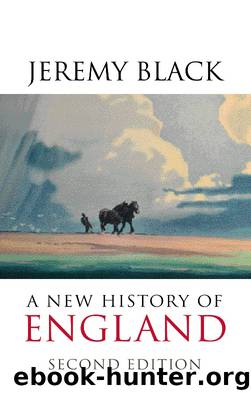A New History of England by Jeremy Black

Author:Jeremy Black [Black, Jeremy]
Language: eng
Format: epub
ISBN: 9780752496245
Publisher: The History Press
Published: 2013-04-07T20:00:00+00:00
TEN
THE EIGHTEENTH CENTURY 1714–1815
Union with Scotland and, more generally, the Revolution Settlement which followed the Glorious Revolution, were put to the test between 1714 and 1716. William III’s sister-in-law and successor, Queen Anne (1702–14), had numerous children but none survived childhood. By the Act of Settlement of 1701, the house of Hanover, descendants of James I through his daughter, were promised the succession, and this led to George, Elector of Hanover, becoming George I in 1714. This was not immediately contested, but discontent rapidly developed in both England and Scotland. George replaced Anne’s Tory ministers by a Whig ascendancy that left the Tories no option in government service. This reflected George’s distrust of the Tories, whom he saw as sympathetic to Jacobitism – the cause of the exiled Stuarts – and also the difficulty of operating a mixed Whig–Tory ministry, although he also saw the danger of being a prisoner of a Whig majority.
The Jacobite rising of 1715–16 was the most serious response. Although it centred on Scotland, there was also a rising in North-East England in 1715. This led to an advance on Preston where the Jacobites were defeated, as the Scots had been in 1648. Thereafter, Jacobitism remained a threat, but not one that was central to political life. Indeed, until the next Jacobite rising in 1745, divisions among the Whigs took precedence. They focused on competition for ministerial office as well as on differences over foreign policy. The most powerful Whig in this period was Robert Walpole, a Norfolk gentleman landowner. Although he led those Whigs who were in opposition between 1717 and 1720, thereafter he was in office until his fall and retirement in 1742. Between 1720 and 1722, Walpole benefited from the fall-out of the South Sea Bubble, a major financial scandal that compromised leading ministerial figures, and also from the unexpected deaths of his two leading Whig opponents, Stanhope and Sunderland. He swiftly rose to dominate politics.
Walpole was invaluable to George I (1714–27) and George II (1727–60) as government manager and principal spokesman in the House of Commons, and as a skilful manager of the state’s finances. He also played a major role in the successful elections of 1722, 1727 and 1734. Aside from his policies, Walpole was adept in parliamentary management and in his control of government patronage. He helped to provide valuable continuity and experience to the combination of limited monarchy with parliamentary sovereignty. While Walpole maintained a Whig monopoly of power, he took more care than his predecessors not to support policies that would alienate Tory opinion. In particular, his refusal to extend the rights of Dissenters contributed to a lessening of religious tension. As Dissent came to be seen as less of a threat, so it became easier to lessen differences between Whigs and Tory clerics.
The Walpolean system had its defeats, most publicly the failure of the Excise Scheme of 1733, a plan to reorganize indirect taxation, but it lasted until 1742, the longest period of stable one-party rule in a system of regular parliamentary scrutiny.
Download
This site does not store any files on its server. We only index and link to content provided by other sites. Please contact the content providers to delete copyright contents if any and email us, we'll remove relevant links or contents immediately.
Kathy Andrews Collection by Kathy Andrews(11812)
The remains of the day by Kazuo Ishiguro(8969)
Paper Towns by Green John(5177)
Spare by Prince Harry The Duke of Sussex(5175)
The Body: A Guide for Occupants by Bill Bryson(5080)
Industrial Automation from Scratch: A hands-on guide to using sensors, actuators, PLCs, HMIs, and SCADA to automate industrial processes by Olushola Akande(5048)
Machine Learning at Scale with H2O by Gregory Keys | David Whiting(4292)
Be in a Treehouse by Pete Nelson(4033)
Never by Ken Follett(3937)
Harry Potter and the Goblet Of Fire by J.K. Rowling(3848)
Goodbye Paradise(3798)
The Remains of the Day by Kazuo Ishiguro(3390)
Into Thin Air by Jon Krakauer(3384)
Fairy Tale by Stephen King(3370)
The Cellar by Natasha Preston(3333)
The Genius of Japanese Carpentry by Azby Brown(3286)
120 Days of Sodom by Marquis de Sade(3261)
Reminders of Him: A Novel by Colleen Hoover(3091)
The Man Who Died Twice by Richard Osman(3072)
